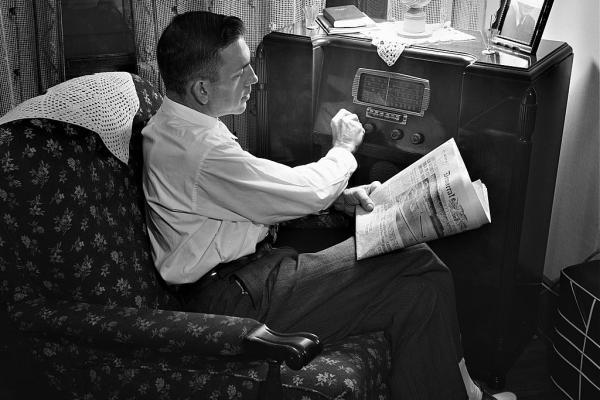Now Streaming: Archival Radio & Contemporary Podcasts

Photo courtesy of the Library of Congress

Photo courtesy of the Library of Congress
Since the early 20th century, people have tuned in to the radio for news, entertainment, and connection to the larger world. As the medium has evolved in the internet age, National Endowment for the Humanities (NEH) grants have supported the preservation of historic broadcasts and invested in new technology and innovative programming that explores history and culture. Technical infrastructure improvements in Nevada, purchase of supplies for audio preservation in Tennessee, and production of podcasts from New York to Colorado are among the many projects NEH has supported to safeguard radio’s legacy and bring humanities content to the public.
On July 8, 1924, New York City’s WNYC aired its very first live broadcast—a three hour and 26 minute program of music and speeches. Nearly 100 years later, WNYC broadcasts all day, every day, alongside six sister New York Public Radio (NYPR) stations, bringing breaking news, classical music, arts and culture, and popular podcasts to the United States’ biggest city and beyond. As the network draws closer to its centennial, the NYPR Archives is working to preserve recordings of historic WNYC and WQXR broadcasts, with support from NEH’s Office of Challenge Programs. In 2020, NYPR received an NEH Infrastructure and Capacity Building Challenge grant to preserve physical assets and implement a Digital Asset Management System, allowing them to document American cultural history through radio. Home to more than 70,000 audio recordings, news items, photographs, memorabilia, and more, the NYPR Archives tell the story of the stations and the American people that tuned in.
In Chicago, the Studs Terkel Radio Archive used a Digital Projects for the Public production grant from NEH’s Division of Public Programs in 2017 to make more than 2,000 conversations with the legendary WFMT radio host available online, with plans to add more than 3,000 programs from his 45-year career at the station over time. Managed by the Chicago History Museum and WFMT, the archive began digitizing Terkel’s interviews with twentieth-century newsmakers with the Library of Congress in 2009, and in 2014 began the process of making the recordings publicly available with a planning grant from NEH. Today, these broadcasts are available online and searchable by topic, date, keyword, and guest, providing a rich humanities resource to explore civic and cultural life from the perspective of leading figures, and average Americans, across four decades.
In Puerto Rico, a 2018 emergency grant from NEH’s Division of Preservation and Access to the Puerto Rico Public Broadcasting Corporation (PRPBC) helped repair damage to WIPR’s archives in the wake of Hurricane Maria. The first public broadcasting station in Latin America, WIPR houses archival audio and audiovisual recordings dating to 1950, detailing Puerto Rico’s history and culture into today. With NEH support, PRPBC worked to both repair archival storage facilities following Hurricanes Irma and Maria and planned for preservation of materials in the face of future storms—all in consultation with preservation experts.
Other NEH infrastructure grants have expanded broadcasters’ capacity to create new humanities-based programming. In 2019, Nevada Public Radio (NVPR) was awarded an NEH Infrastructure and Capacity Building Challenge grant to modernize the production facility and equipment necessary to broadcast to the network’s audience of 2.7 million people. NEH Challenge grants leverage private investment, requiring that grant funds be matched by additional outside funding. NVPR’s “Give Voice” initiative raised additional funding needed to complete the extensive project, which includes facility construction, purchase of digital audio equipment and transmitters, and completion of the statewide facility connection to deliver humanities content throughout Nevada.
Today, many listeners access radio programming via online streaming and podcasts, one of the fastest growing mediums of the last decade. NEH is a major funder of podcasts that bring history, ideas, and culture to vast audiences. Funding awarded through NEH’s Division of Public Programs supports an array of media projects, including the production and distribution of radio programs and original podcasts. Listen to one of these NEH-supported podcasts through your favorite streaming service or at the links below:
Audio History Project
Audio History Project, produced by Radio Diaries, explores America’s complex past through audio documentaries, created with oral histories and archival footage. Episodes include “My Iron Lung,” “The End of Smallpox,” and “The Almost Astronaut.”
The Keepers
The Kitchen Sisters’ series “The Keepers” tells the stories of the archivists, librarians, historians, and curators who do the daily work of caring for our cultural heritage and the collections they maintain. Supported in season two by NEH, “The Keepers” is a limited series on NPR’s Morning Edition and the podcast, The Kitchen Sisters Present.
Lost Highways: Dispatches from the Shadows of the Rocky Mountains
Presented by History Colorado, Lost Highway brings overlooked stories of the American West to the airways. Hosted by Noel Black, each episode of the podcast explores how untold stories of the past have shaped the world we live in today.
Subtitle
Produced by Quiet Juice and the Linguistic Society of America since 2019, Subtitle has explored the hosts’ obsession with language in more than 40 episodes with guests including comedians, writers, and researchers.
Innate: How Science Invented the Myth of Race
In this ten-episode series of the Distillations podcast, the Science History Institute investigates the historical roots of racism in American science and medicine, tracing the stories of the past to the realities of today. New episodes will be released weekly beginning February 7, 2023.